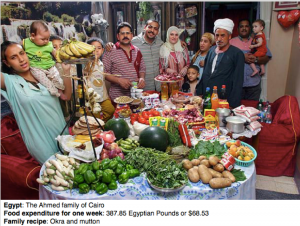Americans have a bad reputation for their eating habits, for good reason. The Revis’ of North  Carolina spend $341.98 a week on food – but very little of it is actually “food”. It is particularly challenging to find even one piece of fresh produce among the packaged goods. In contrast, the Egyptian family from Cairo, the Ahmeds, spend the equivalent of $68.53 on food, and they are surrounded by fresh fruits, vegetables, and unpackaged meat. There are only a handful of packaged food items on their table, and a few bottles of soda. Whether or not $68.53 is a lot or a little in Cairo, the Ahmeds are clearly making different choices than the Revis’, even though they, too, live in an industrialized city with access to prepared, packaged, and fast food.
Carolina spend $341.98 a week on food – but very little of it is actually “food”. It is particularly challenging to find even one piece of fresh produce among the packaged goods. In contrast, the Egyptian family from Cairo, the Ahmeds, spend the equivalent of $68.53 on food, and they are surrounded by fresh fruits, vegetables, and unpackaged meat. There are only a handful of packaged food items on their table, and a few bottles of soda. Whether or not $68.53 is a lot or a little in Cairo, the Ahmeds are clearly making different choices than the Revis’, even though they, too, live in an industrialized city with access to prepared, packaged, and fast food.

There are many factors contributing to these differences, with cultural influences playing a tremendous role. American families have been reducing the percentage of income they spend on food, as well as the time they spend in the kitchen preparing that food. While the instant foods the Revis family and so many others like them consume in mass may quickly satisfy hunger, they do not offer complete or lasting nutrition. This cultural acceptance of a quick fix, rather than emphasis being placed on the holistic value of eating a home prepared and cooked meal, is one reason health and nutrition issues continue to plague Americans. This story of the rise of sugar as a regular staple in households worldwide is a fascinating example of how the world’s food has changed significantly in just a few hundred years. Sugar, once a highly coveted luxury item, is now the opposite – available in high volumes in every packaged good sold on the shelves of corner markets globally.
Based on their one snapshot, the Ahmed family has not experienced similar cultural shifts compared to their US counterparts. With far fewer external influences in trade, and less political oversight in food consumption, like subsidies, the diets of developing nations are generally not dictated by lobbyists with corporate interests in the same way as the US. It is clear from the Ahmed family image that more (inter-generational) family members are living together and sharing meals. Instead of individuality, community and the value of sharing is still prevalent.
